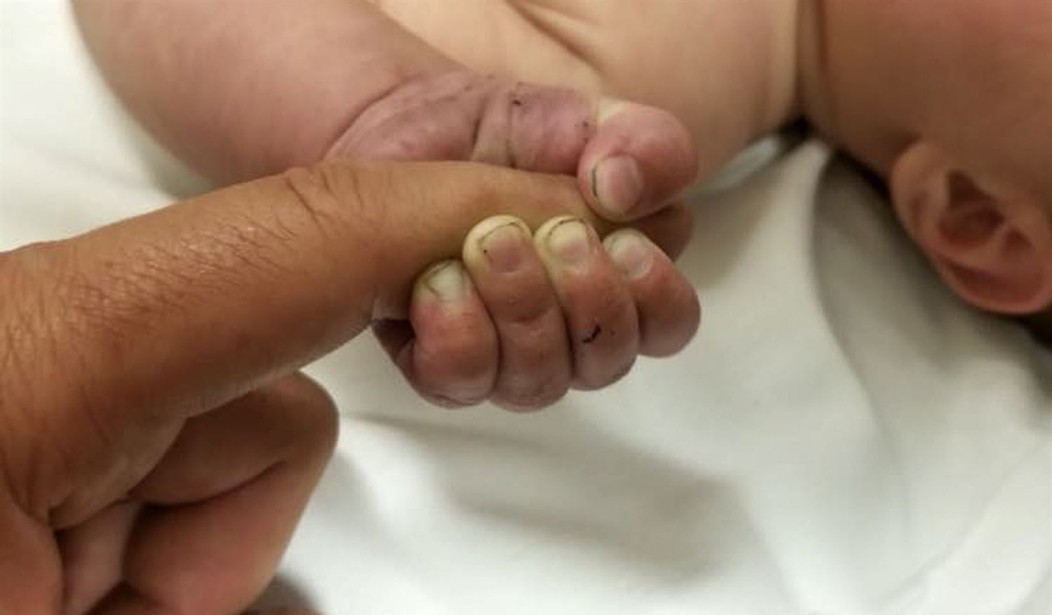The COVID-19 pandemic has resulted in any number of absurd proclamations and public policy decisions. Recently, the American Academy of Pediatrics (AAP) asserted that mask-wearing does not impair language and social development in young children. This assertion upended decades of research about how children learn to speak and pick up social cues. The group’s updated school guidance recommends masking for all children over the age of two attending in-person learning.
The AAP acknowledges that children, especially those under 10, have not suffered from severe illness during the pandemic. They recommend masking children to protect adults. What enlightened society puts burdens on children for the benefit of adults? One where the people in charge have gone insane. Two recent studies provide insight into the deranged moment we are living through.
First, a study in preprint puts the AAP’s politicized recommendations to shame. Researchers leveraged an ongoing longitudinal study of neurodevelopment in children. They compared general cognitive scores of children in 2020 and 2021 to those from 2011 to 2019:
We find that children born during the pandemic have significantly reduced verbal, motor, and overall cognitive performance compared to children born pre-pandemic. Moreover, we find that males and children in lower socioeconomic families have been most affected. Results highlight that even in the absence of direct SARS-CoV-2 infection and COVID-19 illness, the environmental changes associated COVID-19 pandemic is significantly and negatively affecting infant and child development.
The paper explains that the infant’s brain has an immense capacity to learn, remodel, and adapt. It is also sensitive to the surrounding environment:
Optimal brain development depends on secure and trusting relationships with knowledgeable caregivers who are responsive to the infant’s needs and interests. Neurodevelopmental processes, including myelination and synaptogenesis, for example, are stimulated by external cues and experiences like maternal interaction, and physical skin-to-skin “kangaroo” care, touch, and warmth. The brain’s adaptive plasticity, however, is a double-edged sword. While positive and enriching environments can promote healthy brain development, neglect insecurity, stress, and lack of stimulation can impair maturing brain systems and disrupt cognitive and behavioral outcomes.
Maternal stress, even during pregnancy, can impact the structure and function of a child’s brain. The researchers also note that parental job loss is associated with differences in birth weight, mortality, temperament, and cognitive development. The pandemic caused significant employment disruption and notable elevations in clinical symptoms of depression and anxiety in adults and children.
After comparing the cohorts on the measures used in the longitudinal study, the researchers concluded:
The COVID-19 pandemic has fundamentally altered the child health landscape, with pregnant mothers and individuals, and children living in a strikingly different economic, psychosocial, and educational environment than what was present just 18 months ago. Against this environmental backdrop, unanswered questions remain regarding the impact of the work-from-home, shelter-in-place, and other public health policies that have limited social interaction and typical childhood experiences on early child neurodevelopment. In this work, we provide early evidence suggestive of significant reductions in attained cognitive function and performance in children born over the past 18 months during the pandemic.
It is not clear how children will make up these deficits or if they can. The plasticity of the infant’s brain is remarkable. However, in some cases, the door closes on creating a critical pathway.
Research before the pandemic demonstrated that psychological and economic harms inflicted on parents have detrimental effects on an infant’s cognitive development. A comprehensive public health response to COVID-19 would have taken this kind of information into account. Individuals in positions of authority should have used information like this to craft a response that decreased panic. Instead, the pandemic response created mass hysteria on a scale not seen previously, according to a peer-reviewed study.
In a paper published in the International Journal of Environmental Research and Public Health, researchers conclude that the government’s actions, authoritative sources, the media, and social media contributed to creating mass hysteria on a global scale. According to the analysis, the size and power of the state contributed significantly to the development of mass hysteria:
The more centralized and the more power a state has, the higher the probability and extension of mass hysteria. In a minimal state, there exist self-correcting mechanisms that limit collective hysteria. The enforcement of private property rights limits the harm inflicted by those that succumb to the hysteria. The state (thanks to a fuzzy public sector and its soft power) by contrast, amplifies and exacerbates mass panics, potentially causing important havoc. What are temporarily, locally limited, isolated outbreaks of mass hysteria, the state may convert into a global mass hysteria for an extended period of time.
The researchers also note that widespread panic can have catastrophic results:
Mass hysteria can have enormous public health costs in terms of psychological stress, anxiety, and even physical symptoms. To these costs must be added indirect adverse health effects from alcoholism, suicides, or damage from deferred treatment and delayed recognition of illness. Policy failures in mass hysteria can lead to economic decline and poverty, which in turn negatively impacts public health and life expectancy.
The effect on the cognitive development of infants is just one consequence of terrible public health policy. Only a deranged society continues to hurt the most vulnerable to make adults feel better. And while these draconian mitigation measures should stop immediately, there is no end in sight in some areas of the country.
Related: Is COVID-19 Really Impacting Kids? Or Is This the Latest Panic to Push Restrictions and Mandates?










